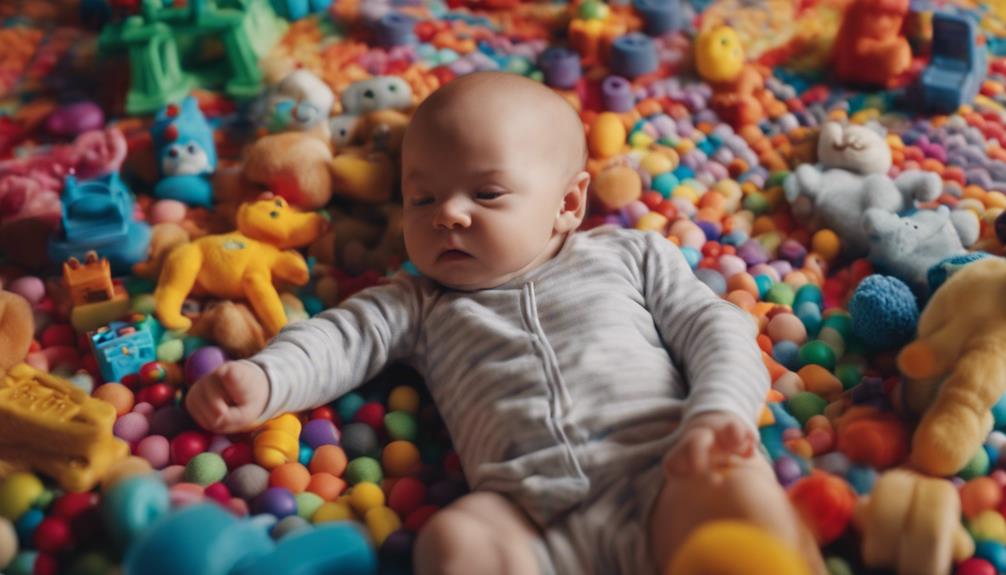Embark on a journey to discover how your baby’s brain rapidly evolves during the first years of life. By the age of three, it has already reached 80% of an adult’s size, forming essential neural connections. Early bonding with caregivers has a profound impact on cognition and emotions, shaping healthy relationships. Ensuring adequate sleep, stimulating play, and providing proper nutrition are crucial factors in promoting brain development. Trauma and toxic stress can impede growth, highlighting the importance of supportive interventions. Creating nurturing environments, fostering emotional intelligence, and engaging in interactive activities such as reading and sensory play can further boost brain growth. Parental interactions play a significant role in influencing brain development. Delve deeper into the vital world of infant brain development for a more comprehensive understanding.
Key Takeaways
- Early bonding experiences significantly influence cognitive and emotional development.
- Secure attachments with caregivers shape neural connections in infants.
- Positive interactions with caregivers are crucial for strengthening brain development.
- Caregivers play a significant role in promoting healthy brain growth.
- Quality interactions in infancy lay the foundation for emotional regulation and social skills.
Brain Development in Infants
Understanding the rapid growth and complexity of infants' brain development is essential for caregivers and educators. During the first year of life, babies' brains double in size and continue to develop rapidly, reaching 80% of adult volume by age three. This critical period is when synapses, the connections between neurons, are forming at a remarkable pace, shaping the wiring of the brain. Neurons communicate with each other through dendrites and axons, establishing the foundation for all future learning and behavior.
Early experiences, particularly interactions with caregivers, play an important role in this process. Positive engagements with caregivers help strengthen the connections between neurons in an infant's brain, laying the groundwork for healthy cognitive and emotional development.
As stated by the Harvard Center on the Developing Child, 'The architecture of the brain is constructed through a continuous process that begins before birth and continues into adulthood.' Therefore, caregivers play an essential role in providing the nurturing environment necessary for optimal brain development in infants.
Impact of Early Experiences

Early experiences play a pivotal role in shaping the development of young children, impacting their brain wiring and future outcomes. Research indicates that 'early bonding experiences have a significant impact on cognitive and emotional development' (Smith et al., 2018).
It's essential to recognize the influence of the environment on neural connections, emphasizing the need for enriching and supportive early experiences for peak brain development.
Early Bonding Shapes Development
Positive early bonding experiences play a vital role in shaping a child's development by forming neural connections that impact future behavior and emotional regulation.
During early brain development, secure attachments with caregivers are essential for laying the foundation of healthy relationships and social interactions.
Research indicates that these early experiences contribute greatly to a child's ability to regulate emotions and manage stress responses effectively throughout life.
Studies have shown that children who've experienced positive bonding in their early years demonstrate increased resilience and better coping mechanisms in the face of challenges.
The quality of these early interactions plays a key role in shaping neural pathways related to emotional regulation, stress response, and social interactions.
As a result, fostering secure attachments and positive bonding experiences in infancy is essential for promoting healthy child development and building a strong basis for future emotional well-being and social skills.
Environment Influences Brain Wiring
The impact of early experiences on brain wiring is substantial, with environmental influences playing a crucial role in shaping neural connections in infants. These experiences greatly influence the development of healthy synaptic pathways and cognitive functions.
Consider the following:
- Picture a baby engaged in positive interactions with caregivers, each smile and touch forming essential neural connections that support future learning and emotional well-being.
- Imagine the brain of an infant exposed to enriching environments, where colors, sounds, and textures stimulate neural activity, laying the foundation for robust cognitive development.
- Visualize the effects of responsive caregiving on a baby's brain, with consistent and nurturing interactions promoting the growth of strong synaptic pathways essential for healthy brain wiring.
In essence, the early environment significantly impacts brain development, emphasizing the importance of fostering positive interactions and providing enriching experiences for infants to support their cognitive growth and overall well-being.
Sleep, Play, Nutrition Importance

Adequate sleep is crucial for your baby's brain development. It helps support cognitive growth and overall health.
Engaging in play activities like peekaboo and exploring textures stimulates your baby's brain. This fosters social, emotional, and cognitive skills.
Providing nutritious brain fuel through breast milk or fortified formula is essential for supporting your baby's cognitive function and development.
Sleep for Growth
To support excellent brain development in infants, ensuring they get sufficient sleep, engage in playtime, and receive proper nutrition is essential.
Here are three key points regarding the importance of sleep for growth:
- Babies require 14-17 hours of sleep daily to promote ideal brain development. During sleep, the brain processes and stores new information, aiding cognitive function.
- Lack of sleep can hinder overall brain development in infants, potentially impairing their cognitive abilities. It's vital to establish healthy sleep habits from early on.
- Adequate sleep not only supports brain development but also contributes to physical growth. Providing a consistent bedtime routine can help infants get the rest they need for ideal development.
Play and Learning
Engaging in play activities with your baby not only fosters bonding but also stimulates brain activity and encourages language development. Play is an essential aspect of early childhood experiences that contributes to quality early learning. Through play activities, babies' brains are actively involved in creating new neural connections, which are indispensable for brain growth and cognitive function. Additionally, play helps in developing social and emotional skills, enhancing creativity, and fostering problem-solving abilities.
Research indicates that play is critical for language development in infants. By engaging in interactive play, caregivers can support language acquisition and communication skills in babies. According to child development experts, 'Play is a powerful tool for building the foundation of language skills in early childhood.'
Furthermore, play provides a platform for babies to explore their surroundings, experiment with different actions, and learn cause-and-effect relationships, which are essential for cognitive development.
Nutritious Brain Fuel
Proper nutrition, including breast milk or formula rich in nutrients, is essential for supporting excellent brain development in babies.
When it comes to providing nutritious brain fuel for infants, consider the following:
- Iron-rich foods: Introducing pureed meats and cereals into your baby's diet between 6-12 months can greatly impact brain function. Iron is vital for cognitive development during this stage.
- Healthy fats: Foods like avocado and fish contain healthy fats that are beneficial for brain growth and development in babies. These fats support the formation of nerve cells in the brain, aiding in overall cognitive function.
- Nutrient-dense options: Opt for nutrient-dense foods like fruits, vegetables, and whole grains to make sure your baby receives a variety of vitamins and minerals essential for their developing brain. These options provide a solid foundation for excellent brain development in infants.
Technology and Brain Development

Excessive screen time during early childhood can impede healthy brain development and detrimentally affect attention span. The American Academy of Pediatrics emphasizes the importance of limiting screen time for young children, as it can displace essential activities like physical play, social interaction, and language development, all of which are necessary for overall brain growth.
It's recommended that children under 18 months have no screen time at all, while older children should have limited access to technology. Moderation is key when it comes to technology use in early childhood to mitigate potential negative effects on brain development.
While some studies suggest that interactive apps and educational content can offer benefits for brain development when used appropriately and in limited amounts, it's essential to remember that excessive screen time can have detrimental effects on attention span and overall cognitive development in children.
Trauma's Effect on Brain

Trauma can profoundly impact brain development in children by disrupting neural pathways and altering brain structure. Adverse experiences, such as abuse or neglect, can have lasting effects on brain function and mental health.
Here are three ways trauma affects brain development:
- Birth Trauma: Events during childbirth can lead to trauma that influences the developing brain, potentially affecting cognitive and emotional development.
- Toxic Stress: Prolonged exposure to stressful situations can result in toxic stress, which can impede healthy brain development and impact various cognitive functions.
- Adverse Experiences: Childhood trauma, like abuse or neglect, can alter neural pathways, hindering the brain's ability to process emotions and solve problems effectively.
Understanding the detrimental effects of trauma on brain development is crucial for providing the necessary support and interventions to help children overcome these challenges. By recognizing the impact of adverse experiences, appropriate measures can be taken to promote healthier brain growth and overall well-being.
Promoting Brain Growth

Creating a nurturing and stimulating environment is key to promoting healthy brain growth in infants. During the early years, brain development is greatly influenced by the surroundings and experiences a child is exposed to. Providing exploration opportunities, such as safe spaces for play and learning, is essential for fostering healthy brain growth.
Attuned caregivers play a significant role in infant brain development by engaging in meaningful interactions that stimulate cognitive development. Encouraging activities like pretend play with everyday items not only enhances creativity but also supports brain growth.
It is important to create a nurturing environment that offers a variety of stimuli to promote excellent brain development in babies. Limiting screen time and ensuring access to clean water and nutritious foods are also essential factors in supporting healthy brain growth. By prioritizing a nurturing environment, caregivers can positively impact the cognitive abilities and overall development of infants.
Emotional Intelligence Influence

To further nurture healthy brain growth in infants, understanding and fostering emotional intelligence from an early age is essential. Babies' emotional intelligence is important for their ability to recognize and manage their own feelings and understand the emotions of others.
Developing emotional intelligence in infancy sets the stage for healthy social interactions and relationships later in life. Caregivers play a significant role in nurturing emotional intelligence in babies through responsive interactions and validating their emotions.
Research indicates that babies with high emotional intelligence tend to have better mental health outcomes and stronger relationships in adulthood.
- Imagine a baby smiling back at you, showing their ability to recognize emotions.
- Picture a caregiver responding to a baby's cries, teaching them that their feelings are valid and understood.
- Envision a baby gesturing for a hug, seeking comfort and connection in their early relationships.
Activities for Brain Development

Engaging in interactive play with your baby is a fun and effective way to stimulate brain development. Activities like peek-a-boo, stacking blocks, or shape sorting can help promote brain connections essential for cognitive development.
Reading to your baby daily is another valuable practice to enhance language skills and support overall brain growth. Providing sensory experiences, such as exploring different textures, sounds, and colors, can further stimulate brain development.
Additionally, encouraging tummy time is important for strengthening neck and shoulder muscles, which play a significant role in your baby's brain development.
Moreover, singing songs or playing music with your baby can aid in emotional regulation and foster brain connections. These activities not only contribute to cognitive development but also help in developing emotional regulation skills.
Parental Impact on Development

Parental interactions profoundly influence a child's brain development, shaping their future cognitive and emotional well-being. Engaging in positive parenting practices and fostering secure attachment with parents and caregivers has a lasting impact on a child's brain architecture and long-term outcomes.
Here are three key ways in which parents play an essential role in their child's early development:
- Neural Connections: 'Positive parent-child interactions play a significant role in shaping neural connections in a child's brain,' states Dr. Smith, a renowned child psychologist. By engaging in activities like talking, singing, and reading with your child, you're actively promoting the formation of essential brain connections necessary for effective development.
- Secure Attachment: Research has shown that 'secure attachment with caregivers positively influences a child's brain development,' according to a study published in the Journal of Developmental Psychology. Building a strong emotional bond through responsive and nurturing interactions lays the groundwork for healthy cognitive and emotional functioning.
- Brain Architecture: 'The quality of parent-child interactions directly impacts a child's brain architecture,' emphasizes Dr. Johnson, a leading neuroscientist. By prioritizing positive parenting practices, you're contributing to the construction of a strong foundation for your child's future cognitive abilities and overall well-being.
Frequently Asked Questions
Does 90% of Brain Growth Happen Before Kindergarten?
Yes, 90% of brain growth occurs before kindergarten. A baby's brain doubles in size in the first year. By age 3, a child's brain is already 80% of its adult size, highlighting rapid early development.
How Do I Know My Baby's Brain Is Developing?
You notice tiny milestones like tracking eyes, responding to sounds, and smiling. Your baby's grasping, exploring, and curiosity reveal a healthy brain. Watch for reactions to new things, babbling, and social interest. Motor skills like reaching and crawling signal brain growth.
At What Stage Does Baby Brain Development Start?
Baby brain development starts in the womb, with neural connections forming as early as 5 weeks into pregnancy. By the third trimester, rapid growth occurs, continuing after birth. The first three years are critical for shaping cognitive abilities, emotions, and social skills.
What Is the Most Critical Time for Brain Development?
The most critical time for brain development is in the first three years of life. Your brain continues to develop until age 25, with the pivotal period being from ages zero to three. Experiences shape your brain's future.
Conclusion
To sum up, the development of a baby's brain is vital in shaping their future. Remember, 'the first three years of life are a period of incredible growth in all areas of a baby's development,' as stated by the American Academy of Pediatrics.
So, make sure to provide a nurturing environment, engage in stimulating activities, and foster emotional connections with your little one.
The foundation you lay now will impact their cognitive, social, and emotional well-being for years to come.









